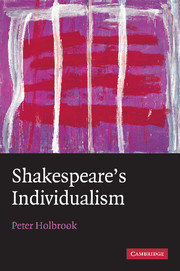Book contents
- Frontmatter
- Contents
- Acknowledgements
- Introduction
- PART I SHAKESPEARE, HAMLET, SELFHOOD
- 1 Hamlet and failure
- 2 ‘A room … at the back of the shop’
- 3 Egyptianism (our fascist future)
- 4 ‘Become who you are!’
- 5 Hamlet and self-love
- 6 ‘To thine own self be true’
- 7 Listening to ghosts
- 8 Shakespeare's self
- PART II SHAKESPEARE AND EVIL
- PART III SHAKESPEARE AND SELF-GOVERNMENT
- Conclusion: Shakespeare's ‘beauteous freedom’
- Index
- References
8 - Shakespeare's self
Published online by Cambridge University Press: 06 July 2010
- Frontmatter
- Contents
- Acknowledgements
- Introduction
- PART I SHAKESPEARE, HAMLET, SELFHOOD
- 1 Hamlet and failure
- 2 ‘A room … at the back of the shop’
- 3 Egyptianism (our fascist future)
- 4 ‘Become who you are!’
- 5 Hamlet and self-love
- 6 ‘To thine own self be true’
- 7 Listening to ghosts
- 8 Shakespeare's self
- PART II SHAKESPEARE AND EVIL
- PART III SHAKESPEARE AND SELF-GOVERNMENT
- Conclusion: Shakespeare's ‘beauteous freedom’
- Index
- References
Summary
Hamlet is constructed around the question of what makes a genuine self – what authenticity and freedom are. But Hamlet's creator has himself come to stand for a peculiarly intense mode of self-realization, that of genius. As already noted, Jonathan Bate has shown it was Romantic esteem for Shakespeare, a determination to defend his achievement against the disparagement of neo-classical critics, that invented the notion of genius. Genius ignored rules. ‘No bird soars too high, if he soars with his own wings’, wrote Blake. Genius could never go wrong because it made the law. One of the key figures in this expressivist cultural turn was, as we have seen, the Bardolater Johann Gottfried von Herder. Herder sparked Goethe's love of Shakespeare: there is an intriguing connection between the birth of cultural historicism with Herder and the emergence of a Romantic Shakespeare cult in Germany and England. Herder's opinion that every culture formed a unique pattern and could only be judged from within, and that there were no universal criteria against which all cultures could be compared, is echoed in Coleridge's urging German writers to stop looking to France for literary models: ‘O Germany! Germany! … Why, this endless Looking-out of thyself?’ Germany should be herself. This cultural relativism is individualism at the level of whole societies. Central to it is the notion of organic – as opposed to artificial, imposed or mechanical – order.
- Type
- Chapter
- Information
- Shakespeare's Individualism , pp. 92 - 100Publisher: Cambridge University PressPrint publication year: 2010



